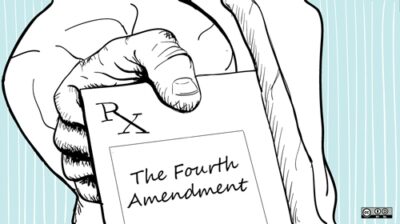
Oregon Prescription Drug Monitoring Program v. Drug Enforcement Administration
What's at Stake
The ACLU and its Oregon affiliate are challenging the federal Drug Enforcement Administration's claim that it can access Oregonians' private prescription records without a warrant. The ACLU and the ACLU of Oregon represent a group of Oregon patients and a physician who are concerned about the impact on medical privacy and the doctor-patient relationship if federal law enforcement were permitted to access prescription records without demonstrating probable cause to a neutral judge. A district court judge ruled in February 2014 that patients have a reasonable expectation of privacy in their prescription records and that law enforcement must obtain a warrant in order to search such information. In June 2017, the Ninth Circuit Court of Appeals reversed the district court’s ruling on procedural grounds but recognized that medical records are private and sensitive and require strong legal safeguards, leaving the door open to future challenges.
Summary
In 2009, the Oregon legislature created the Oregon Prescription Drug Monitoring Program (PDMP), which tracks prescriptions for certain drugs dispensed by Oregon pharmacies. The database tracks prescriptions for medications needed to treat chronic and acute pain, anxiety and panic disorders, weight loss associated with AIDS, Attention Deficit Hyperactivity Disorder, and other conditions, as well as the testosterone needed by many transgender men. Because the medical information revealed by these prescription records is highly sensitive, the legislature created robust privacy protections, which include the requirement that law enforcement obtain a warrant before requesting records for use in an investigation. However, the DEA has claimed that a federal statute allows them to access those records without obtaining a warrant from a judge.
The State of Oregon sued in November in the U.S. District Court for the District of Oregon to prevent the DEA from circumventing Oregon law. In January 2013, the ACLU intervened in the suit to make sure that the constitutional rights of individual patients and doctors in Oregon are represented, arguing that the Fourth Amendment privacy rights of Oregonians are violated when the federal government can access their private medical information without first demonstrating any wrongdoing.
Legal Documents
-
06/26/2017
Ninth Circuit Opinion -
01/21/2015
DEA Reply Brief -
12/12/2014
Amicus in Support of ACLU -
12/05/2014
Appellee's Brief -
12/05/2014
Plaintiffs-Intervenors-Appellees' Brief -
10/06/2014
Appellant Brief
Date Filed: 12/05/2014
Court: Appeals Court (9th Cir.)
Download Document-
02/11/2014
Opinion and Order -
09/23/2013
Plaintiffs-Intervenors' Response to DEA's Cross-Motion for SJ and Reply in Support of PI's Motion -
08/20/2013
DEA's Memo in Support of Cross-MSJ Against PI and Response to MSJ -
07/01/2013
Plaintiff-Intervenors' Motion for Summary Judgement -
-
07/01/2013
Declaration of John Doe 1 -
07/01/2013
Declaration of John Doe 2 -
07/01/2013
Declaration of John Doe 3 -
07/01/2013
Declaration of Professor Robert Baker -
07/01/2013
Declaration of Dr. Deborah C. Peel -
07/01/2013
Declaration of Professor Mark Rothstein -
07/01/2013
Declaration of Nathan Freed Wessler -
07/01/2013
Exhibits
Declaration of Professor Robert BakerDate Filed: 07/01/2013
Court: District Court (D. Or.)
Download DocumentDeclaration of Dr. Deborah C. PeelDate Filed: 07/01/2013
Court: District Court (D. Or.)
Download DocumentDeclaration of Professor Mark RothsteinDate Filed: 07/01/2013
Court: District Court (D. Or.)
Download DocumentDeclaration of Nathan Freed WesslerDate Filed: 07/01/2013
Court: District Court (D. Or.)
Download Document -
07/01/2013
-
07/01/2013
Memo of Law in Support of Plaintiffs-Intervenors' MSJ -
06/14/2013
Memo in Support of Plaintiff's MSJ -
05/09/2013
Defendant's Answer to Complaint in Intervention -
04/10/2013
Complaint in Intervention for Declaratory and Injunctive Relief -
03/31/2013
Order Granting Motion to Intervene -
03/01/2013
Reply Memo in Support of Motion to Intervene -
02/20/2013
Defendant's Response to Motion to Intervene -
01/25/2013
Memo of Law in Support of Motion to Intervene -
01/25/2013
Proposed Complaint in Intervention -
01/25/2013
Memo of Law in Support of Motion to File Complaint in Intervention Using Pseudonyms -
-
01/25/2013
Declaration of John Doe 1 -
01/25/2013
Declaration of John Doe 2 -
01/25/2013
Declaration of John Doe 3 -
01/25/2013
Declaration of John Doe 4 -
01/25/2013
Declaration of Dr. James Roe
Declaration of Dr. James RoeDate Filed: 01/25/2013
Court: District Court (D. Or.)
Download Document -
01/25/2013
Date Filed: 09/23/2013
Court: District Court (D. Or.)
Download DocumentDate Filed: 08/20/2013
Court: District Court (D. Or.)
Download DocumentDate Filed: 07/01/2013
Court: District Court (D. Or.)
Download DocumentDate Filed: 07/01/2013
Court: District Court (D. Or.)
Download DocumentDate Filed: 06/14/2013
Court: District Court (D. Or.)
Download DocumentDate Filed: 05/09/2013
Court: District Court (D. Or.)
Download DocumentDate Filed: 04/10/2013
Court: District Court (D. Or.)
Download DocumentDate Filed: 03/31/2013
Court: District Court (D. Or.)
Download DocumentDate Filed: 03/01/2013
Court: District Court (D. Or.)
Download DocumentDate Filed: 02/20/2013
Court: District Court (D. Or.)
Download DocumentDate Filed: 01/25/2013
Court: District Court (D. Or.)
Download DocumentDate Filed: 01/25/2013
Court: District Court (D. Or.)
Download DocumentDate Filed: 01/25/2013
Court: District Court (D. Or.)
Download DocumentPress Releases
ACLU Joins Lawsuit to Defend Confidential Medical Records from Warrantless Federal DEA Searches
Court Rules Warrant Is Required to Access Drug Prescription Database
ACLU Sues to Protect Privacy of Drug Prescriptions



